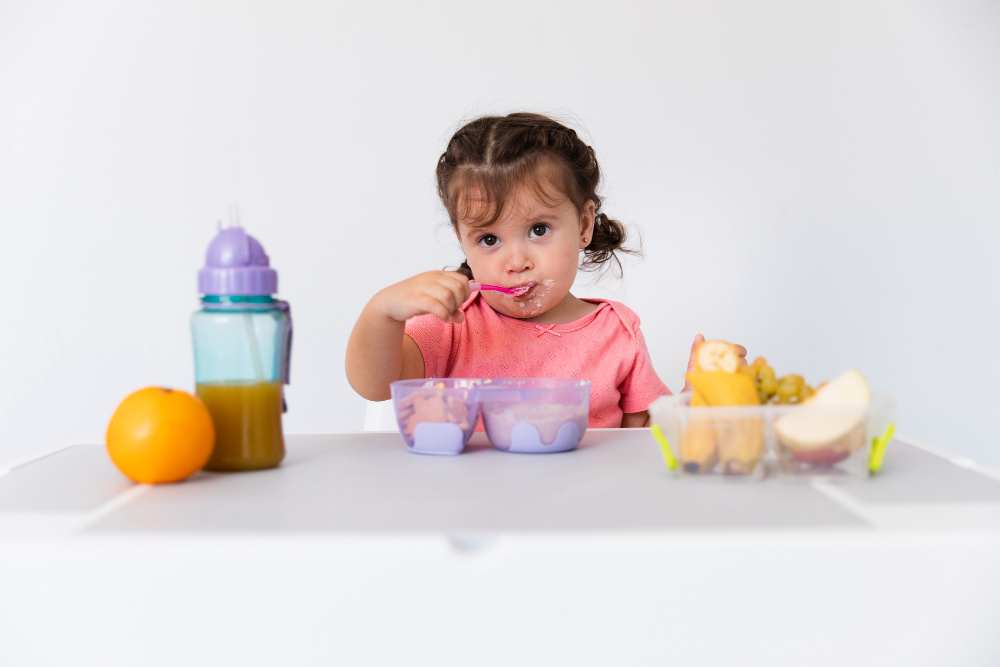As parents, we want to teach our children to eat various foods from an early age. Therefore, after solids are introduced, the child’s daily diet should include a range of foods; there is no mistake about it! Certain meals, however, are not safe for your infant before the age of one year since they may cause choking, and others aren’t ideal for the baby’s developing digestive system.
Below are the top 12 meals that many experts and pediatricians recommend avoiding before your baby turns one!
-
Sugar
Sugar should not be included in your baby’s diet until they are one year old, as it can impact their appetite and cause a diet disruption. In addition, if sugar is introduced to your baby’s diet early on, they may develop a resistance to breast milk. This is primarily related to a preference for flavor. As a result, it’s best to hold off on adding sugar to your baby’s diet.
-
Honey
Botulism bacteria may be present in honey, and these bacteria can cause severe food poisoning in newborns under the age of one. Infant botulism is the name of the disease. As a result, newborns under the age of one should not be given raw honey or any processed meals containing honey.
-
Whole nuts and seeds
Nuts are nutrient-dense food for newborns. Whole nuts, such as almonds, cashews, and walnuts, are difficult for little babies to chew and can cause choking. As a result, kids under the age of five should avoid eating entire nuts. Seeds like sunflower seeds and pumpkin seeds can also be easily inhaled into the baby’s airway, causing an illness.
-
Caffeinated and aerated drinks
The babies should avoid coffee, sodas, tea, sweetened drinks, colas, fizzy drinks, chocolates, energy drinks, and other caffeinated beverages. We may be inadvertently instilling harmful eating habits by feeding them to children. In addition, caffeine can cause dental problems in babies and dehydration, restlessness, malnutrition, and obesity.
-
Unpasteurized cheese
One of the best protein-rich foods for babies is cheese. Soft-ripened cheese, unpasteurized cheese, blue-veined cheese, processed cheese, and imported cheese, on the other hand, are not ideal for young babies. This can result in food poisoning and even severe illness from foodborne illness.
-
Cows milk
Breast milk, as is well known, is the most excellent nourishment for your infant. Breast milk is a healthy meal for your baby because it contains all nutrients and enzymes. On the other hand, cow’s milk contains more lactose, which could upset your baby’s stomach. As a result, cow’s milk should be avoided until the baby reaches the age of a year. After that, cow’s milk is preferable because it is easily digestible and contains nutrients essential for your baby’s development.
-
High mercury fish
Fish is an excellent source of protein, but some types contain high levels of mercury, making them unsafe for tiny newborns (and even toddlers). High mercury levels in fish can harm young children’s brains and neurological systems. Therefore, fish with high mercury levels, such as shark, swordfish, king mackerel, and marlin, should be avoided by small children aged two to six.
-
Sticky foods
Avoid giving your infant a tablespoon of sticky foods. For the reasons listed below, nut butter that is peanut butter/almond butter, chewing gums, marshmallows, jelly, and gummy candy should not be provided. Because of the sticky nature of certain meals,
-
It’s too difficult for your baby to swallow.
-
Large clumps of food can get stuck in your baby’s throat.
-
It’s possible that it’ll get stuck in the back of the baby’s mouth.
-
Putting your infant in danger of choking
-
Saturated fats
Burgers, chips, pizzas, hot dogs, deep-fried store-bought goods, and chat foods are high in salt and saturated fats. It’s possible that it will fill the baby’s stomach without giving enough nourishment.
-
Berries/Citrus Fruits
Despite the fact that citrus fruits and berries are beneficial to human health, strawberries, blackberries, blueberries, oranges, raspberries, limes, and other berries contain high quantities of acid and Vitamin C, which can cause stomach upset and even diaper rashes. An excellent recommendation is to wait a year or two, or to juice the fruits and dilute them well to avoid allergic responses or stomach distress.
-
Raw vegetables
Green peas, celery, string beans, carrots, baby carrots, and fresh entire corn kernels are too tough for babies to chew, and bits can become caught in their throats. As a result, babies should avoid certain raw veggies.
-
Salt
Babies require less than 1 gram of salt each day, and their kidneys are not yet mature enough to handle more. Most foods, such as vegetables, fruits, lentils, eggs, and so on, naturally contain salt, so there is no need to give your extra infant salt for the first year. However, salt in excess of the prescribed amount might harm the kidneys. Commercial infant food may include additional salt; read the labels carefully before purchasing.
![]()











